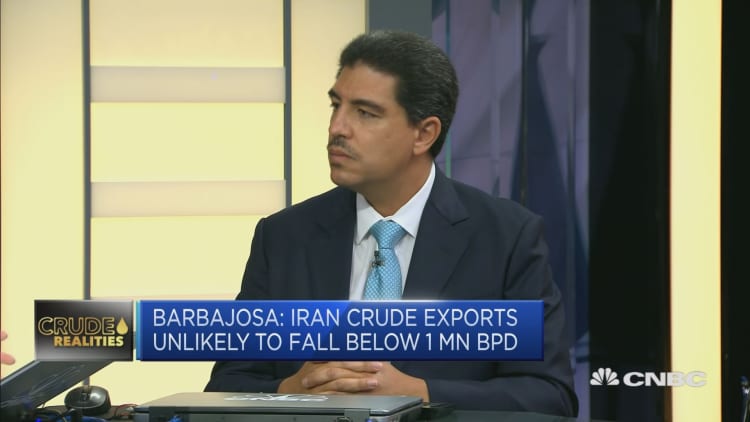
Oil prices, which have risen on worries about Washington's possible withdrawal from the Iran agreement, are unlikely to take a leg higher even if the U.S. ultimately pulls out of deal, according to one expert.
Markets have already factored in the possible effect of the U.S. re-sanctioning Iran, currently the third-largest oil producer in the Organization of the Petroleum Exporting Countries.
"We've already seen that bullishness factored in over the past few weeks ... The markets have already reacted to the expectation of less supplies going forward," Alejandro Barbajosa, vice president at Argus Media, told CNBC's Nancy Hungerford.
As a result, it will be difficult for oil prices to advance under current circumstances, Barbajosa said.

Oil prices declined in Asia trade on Tuesday, following a tweet from President Donald Trump that he will announce his decision on the Iran deal on Tuesday at 2 p.m. ET.
The 2015 accord lifted economic sanctions on Iran in exchange for the country limiting its nuclear program and allowing regular inspections of its to atomic facilities. The United States agreed to those terms, and Iran does not appear to have violated the deal, but the Trump administration has said it wants to scrap the agreement.
U.S. crude futures, which had topped the $70 per barrel mark in the last session for the first time since end-2014, had slid 1.2 percent to around $69.88. Brent crude futures were down 1.01 percent at $75.40.
An 'exit strategy' for OPEC
Trump has criticized the Iran deal very extensively, saying it should never have been made. Barbajosa said he expects a "significant decline" in oil prices, should the U.S. attempt to delay a decision on the deal in order to buy time.
"It's just pushing the decision further into the future, but that just means that that buffer of supply that is coming from Iran at present would continue to be there for an extended period of time," he said.
Analysts expect renewed sanctions to take out as many as 500,000 barrels of Iranian oil a day. That may have a limited impact on markets, but it would also hand other OPEC members a chance to increase production.
"OPEC might use this as an opportunity as an exit strategy from the current strategy of restrained supplies, because what we see is that there is little scope for them to start producing again at the levels they would like to produce without having a negative effect on prices," Barbajosa said.
"If Iran gets out of the market, it might be a very natural way for them to say, 'Oh, we need to increase production now, because Iran is no longer there,'" he said.
— CNBC's Tom DiChristopher contributed to this report.




